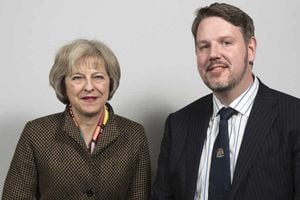Theresa May speaks on Shropshire legal high tragedy during visit
Home Secretary Theresa May spoke of her sadness at the death of Shropshire bricklayer Jamie Penn during a visit to the county – and says the new ban on so-called legal-highs will prevent further deaths.

Speaking to the Shropshire Star, Mrs May said Mr Penn's death was a tragic symbol of how destructive such substances could be.
Mr Penn, 29, of Telford, died after buying the then-legal drug 4,4-DMAR from a woman in Shrewsbury. It reacted with another drug he had taken the previous day, causing him to die a few hours later.
Mrs May said the new Psychoactive Substances Act, which comes into force next month, would make it much more difficult for unscrupulous individuals to peddle such substances.
The Home Secretary also spoke of the need to recruit more special constables in the county, saying they provide extra skills that complement regular officers.
During a visit to Shrewsbury's Lord Hill Hotel, where she was supporting Tory John Campion's campaign to become police and crime commissioner for West Mercia, Mrs May
said commissioners had made a considerable difference to policing in rural areas like Shropshire.
The Psychoactive Substances Act, which was announced in last year's Queen's Speech, will make it illegal to sell or import any mind-altering substances unless specifically exempted from the legislation – such as caffeine, alcohol or tobacco.
It will not, however, make it an offence to take the drugs or to possess them for personal use.
Mrs May said she believed the Act would play a crucial role in preventing deaths like those of Mr Penn.
"That was a very sad and horrible case, and one which is an example have where people have lost their lives from taking these substances which were unbelievably called legal highs," she said.
"That gave everybody the impression that they were perfectly all right, that because they were not illegal they were somehow OK to take and would not do any harm.
"Nothing could be further from the truth they are very harmful.
"We have seen the human costs of people's lives being destroyed. It was for that reason that we now have the new act which I think will make a big difference."
Mrs May said she had stopped short of a ban on personal use because the aim was to target the supply of the drugs rather than those who used them.
"We're looking predominantly at the issue of selling and dealing in those drugs.
"We all know about these 'head shops' that have appeared in the last few years, and it is about closing these down and cutting off the importing and exporting of these substances. The way we have done it should make it relatively easy to enforce," she said, adding that she had great confidence that the police would be able to distinguish between possession for personal use and that with intent to supply.

Mrs May, who sprang to prominence for her flamboyant footwear and her controversial speech about the Conservatives being perceived as "the nasty party" back in 2002, is nothing but the perfect politician.
While in recent years the Home Office has been seen as the graveyard of political careers – famously being described as "not fit for purpose" by her Labour predecessor John Reid, Mrs May has now been in post for almost six years, having managed to avoid many of the controversies which have dogged others who have held the post.
This self-assured professionalism is evident as she pulls up a chair from a corner of the room and takes a seat at the edge of the table.
Businesslike but disarming, courteous but brisk, Mrs May replies to every question swiftly and succinctly, answering everything she is asked, without giving away anything she doesn't need to.
There are none of the off-guard, thinking aloud moments that are meat and drink to the journalist trade.
Like an assured opening batsman, she skilfully knocks away each question before lining up for the next ball.
This year's election for West Mercia's police and crime commissioner is going to be a closely-fought race, with Conservative Mr Campion taking on the present commissioner's deputy, independent Barrie Sheldon.
Mrs May says that having an elected commissioner has had a huge impact on policing, for the first time giving the public a real say in what the priorities should be.
She says that before we had elected commissioners, policing policy was in the hands of largely unaccountable police authorities that few people even knew about, and which made decisions in supposedly public meetings that were rarely attended by the public in any significant numbers.
"What we had was a system of police governance that was broken," she says.
"Theoretically, authorities acted on behalf of the public and had a duty to engage local people and businesses in setting priorities and local taxes, but in practice they did nothing of the sort.
"Meetings that were barely attended and made decisions that were communicated to the public through obscure minutes in forgotten corners of their websites."
She says that the coming elections will give candidates the chance to clearly lay out what they believe the priorities should be, and it is for the public to decide which set of policies they find most attractive.
"Since their inception in 2012, PCCs have engaged with the public in ways that police authorities failed to do," she says.
"They've received upwards of 7,000 pieces of correspondence every month and their websites have been visited by over 85,000 people. With this engagement, initiatives have developed that are targeted directly to the needs of the local community."
One of the biggest changes to policing in Shropshire during her time as Home Secretary has been the formation of the strategic alliance between the West Mercia and Warwickshire forces.
"This has allowed the forces to combine and share resources and ensure 24-hour cover across more policing functions," she says.
But she says decisions about whether there should be greater collaboration in future, such as a single chief constable covering both forces, has to be a decision taken at a local level.
"That is a matter for the individual police and crime commissioners to decide on," she says.
Mrs May adds that the commissioners play a particularly important role in diverse and rural counties such as Shropshire, giving them the power to adopt different policing styles tailored to the different communities.
One of the first pieces of legislation to be introduced in the new parliament following last year's General Election was the Psychoactive Substances Act, which comes into force next year.
Mrs May says the Act was necessary following the tragic deaths of people such as Telford trainee bricklayer Jamie Penn.
"That was a really horrible case, and the Act is important to prevent people dying after taking these substances," she says, adding that many people assumed that because they were not banned they were somehow considered to be safe.
Mrs May says she has great sympathy with hauliers who have to deal with stowaways attempting to make their way over from Calais.
She says the extra security measures being introduced at the port will make a difference, but the real solution will lie in stopping migrants from illegally entering the EU in the first place.
After the dinner, Mrs May adds: "It was useful to meet with John Campion ahead of this important election in May to discuss his plan for lowering crime and creating safer communities in West Mercia.
"It is clear that he has a very thought-out plan focusing on what matters to local residents like increasing police visibility and confronting rural crime and I am confident he can deliver."
Mr Campion adds: "I was delighted to get the backing of the Home Secretary who listened very carefully to what I had to say.
"The police commissioner role is important as it is the voice of the public and holds police to account for cutting crime and keeping communities safe."





